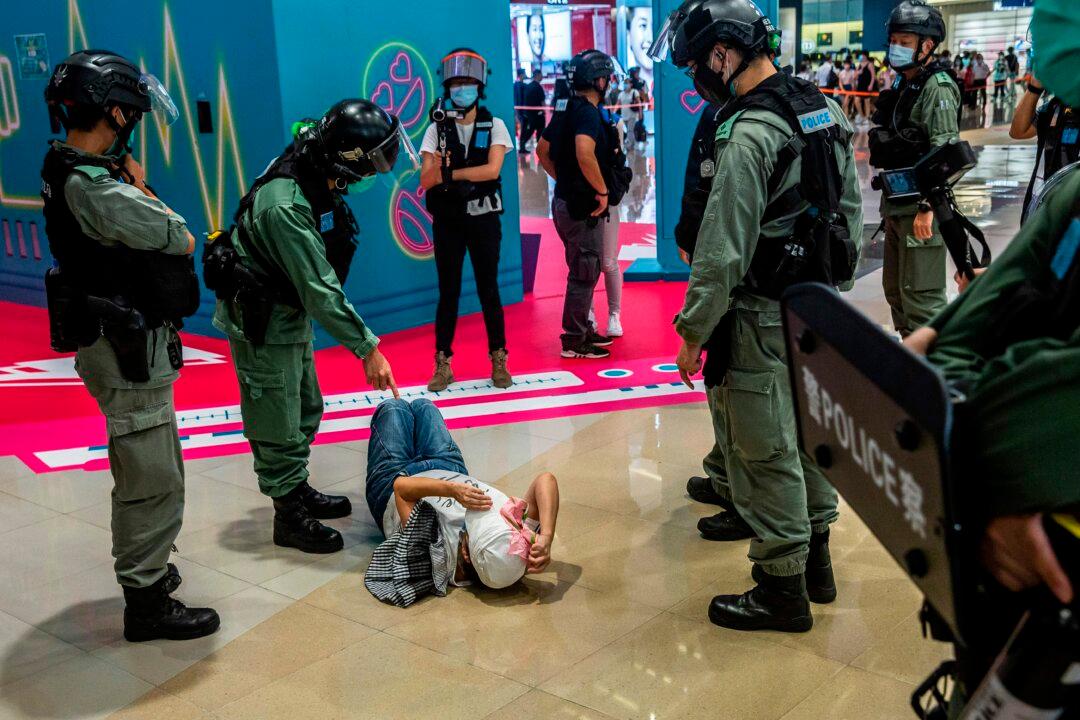It is becoming increasingly clear under Beijing’s new national security law that anyone, anywhere across the globe, can be targeted—a threat experts call unprecedented and an exportation of the country’s oppressive model.
a U.S. citizen and pro-democracy activist, and five others were issued arrest warrants by Hong Kong authorities following the legislation’s implementation.
“Every provision of this law—which was concocted in Beijing and enacted without the Hong Kong legislature—applies to everyone outside of Hong Kong,” Chu wrote in an op-ed. “Nobody is beyond the law’s reach, not me in the United States, and certainly not the estimated 85,000 Americans living and working in Hong Kong itself.”
In response to Beijing’s legislation, the Trump administration on Aug. 7 sanctioned Hong Kong leader Carrie Lam and 10 other Hong Kong and Chinese officials. The sanctions freeze any U.S. assets the officials have, and generally bar Americans from doing business with them. China soon responded with unspecified sanctions against 11 U.S. politicians and heads of organizations promoting democratic causes—matching the same number the United States had originally targeted.One of those 11 sanctioned was Michael Abramowitz, the president of Freedom House, a U.S.-based, government-funded nonprofit.
Annie Boyajian, director of advocacy at the organization, called the law the latest example of the CCP “seeking to export their model of oppression.”
“It’s also very ironic how broadly the CCP says this law applies, given how frequently Chinese officials tout the principles of noninterference and national sovereignty,” Boyajian told The Epoch Times, describing it as “outrageous.”
“To be clear, [Chu] was doing that lobbying work here in the U.S.—to his own government!” Boyajian added.
Chilling Effect
The national security law is “entirely unprecedented” said Scott Watnik, litigation partner at U.S. law firm Wilk Auslander and co-chair of the firm’s cybersecurity practice, noting that it applies to everyone in the world “with zero jurisdictional safeguards or defenses to non-resident foreign nationals.”“China is aiming to instill fear in its critics across the world and control the narrative, so that journalists and government officials will think twice before they criticize China,” Watnik told The Epoch Times. “At least to some degree, China is likely to have some success in bringing about this chilling effect.”
Anyone who comments on affairs in Hong Kong could be at risk of violating the legislation, he said.
The national security law comes in response to months of pro-democracy protests that started in 2019.
“The fact that these stories are getting so little international attention should be frightening to us all,” Donald Kendal, research fellow and co-leader of the Stopping Socialism Project at The Heartland Institute, told The Epoch Times.
The text of the law is so broadly written that all interpretative and enforcement power “lies in Beijing’s hands, with no check on the Chinese government by any judicial or other authority,” Watnik said.
“The law has no limits; it means whatever Beijing says it means,” he added.
There are a multitude of actions the United States can take to combat Beijing’s national security law, such as expanding sanctions to entities involved in human rights violations in Hong Kong, urging other democracies to impose matching sanctions, and welcoming Hongkongers forced to flee their homeland, according to Boyajian.
The transformation of Hong Kong into an authoritarian state is occurring at “nearly breakneck speed,” she said. Instead of Beijing officials viewing Hong Kong as one of their greatest assets, they have unleashed a campaign of oppression that is to “their own detriment.”
In the month since the law went into effect, the Hong Kong government has escalated attempts to curtail the city’s freedoms. Authorities postponed a scheduled September legislative election for a year, citing fears over the CCP virus—which broke out in the Chinese city of Wuhan in late 2019—and disqualified 12 pro-democracy candidates who won votes in an unofficial primary.
Popular protest slogans were also outlawed.
Watnik, like other experts, believes the security law may end up backfiring as the communist regime is now front and center. He called China’s retaliatory sanctions against U.S. lawmakers “weak and empty, as they are of no practical effect.” Imposing economic sanctions on China, as the United States has, may hurt U.S. companies in the short term, he said, but hitting the CCP financially “may be the only way to end totalitarian rule in China.”Chinese officials claimed the national security law would target a small segment of society, but recent events have shown otherwise.
The CCP has created “a blueprint of persecution that identifies, tracks, and suppresses dissenting voices,” David Curry, CEO of Open Doors USA, a nonprofit that aids persecuted Christians globally, told The Epoch Times, noting China’s long track record of oppressing religious minorities.
Beijing’s new law also highlights how the party is willing “to disregard deals they have previously agreed to in order to further their own imperialist interests,” said Edward Bourke, executive director of Australian-based conservative political action group Victoria Forward.
Bourke told The Epoch Times that the CCP only responds to strength, emphasizing that the global community must take a decisive and united stand against the CCP by employing appropriate punitive measures.





